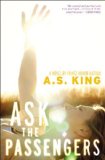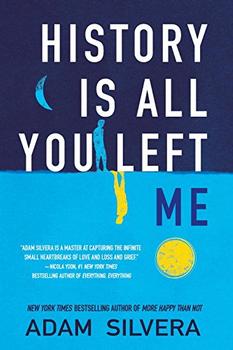Summary | Excerpt | Reviews | Beyond the book | Read-Alikes | Genres & Themes | Author Bio

Astrid, the main character in A. S. King's new novel, Ask the Passengers, explores questions about herself, her friends, her family, and her life. The seventeen-year-old is smack in the middle of figuring out her blossoming sexuality, and so this is, truly, her coming-out story. This always-puzzling process is made even more confusing by her very dysfunctional family - a mother who takes her younger sister out drinking and a father who smokes pot in the garage. It is also complicated by the fact that she carries the secret of her best friend Kristina's own lesbian sexual identity (she helps perpetuate the lie that Kristina and Justin - both the most popular kids in their small town of aptly named Unity Valley - are in love) but can't talk to Kristina about her own new burgeoning love.
Did you catch that? That word? Love? It is love that skyrockets this already brilliant and beautiful story high into the atmosphere.
Astrid has love. Lots of it. And because she can't seem to find a pathway from herself to the people on the ground around her - those aforementioned friends and family - she sends her abundance of love up to the passengers in the planes she sees in the sky:
"Every airplane, no matter how far it is up there, I send love to it. I picture people in their seats with their plastic cups of soda or orange juice or Scotch, and I love them. I really love them. I send a steady, visible stream of it - love - from me to them. From my chest to their chests. From my brain to their brains…I don't care if they don't love me back. This isn't reciprocal. It's an outpouring. Because if I give it all away, then no one can control it. Because if I give it all away, I'll be free."
She lies on the picnic table outside her house, gazes up into the wide sky, seeks and finds those airplanes and, in its purest and most free form, gives her love to the people inside them. Strangers. Strangers just happening to pass by at those particular moments. Strangers with their own lives, their own families and friends - strangers with their own complicated, deep, frightening, and liberating love.
I am madly in love (yes, love) with this gesture. I am also deeply impressed with the way King has chosen to structure this gesture. She gives each love-given passenger a one-time monologue within the novel. Readers get to see snapshots of the lives of these strangers, who are then not strangers any more. We get to witness the connections they make with Astrid, even though they don't know it. We get to see how Astrid's love just might make a difference in their lives, and in their loves. We get to live in those moments when the thread between the giver and the receiver is in contact with both. The result is both very surprising and (surprisingly) familiar. And comforting. And hopeful. For example, after Astrid gets herself into trouble and can't tell her parents a truth about herself, she feels, surprisingly, unashamed. She goes to her spot on the picnic table and asks the passengers: Why don't I feel ashamed right now? Is that a sign? The very next chapter is narrated from a middle-aged female passenger's point of view and we learn that she is ashamed of something that happened to her forty years earlier (when she was, most likely, the same age as Astrid.) So we, the readers, are privy to the ways Astrid's life overlaps with those of the passengers.
We all struggle with feelings we can't decipher. We all struggle to find ways to express the feelings we do manage to identify. And we tend to spend time looking inward as we sift and problem-solve and make decisions about those feelings. Sometimes that is a good process. But sometimes it falls short. And here is what Ask The Passengers made me think: In those falling-short moments, what if we engaged in a process like Astrid's? What if we sifted and problem-solved and made those decisions in the context of the wide sky? The open field? The dense, chattering forest? The vast ocean? What if we recognized that the world is full of people, creatures, plants, and life that are both so similar to and so different from us, all at the same time? If we seek answers out in the world we just might find strangers, in whatever form, who can help us. And in our simply seeking, in that humble process, we will most definitely begin to help ourselves - and we just might help those strangers too.
This is what happens to Astrid. She uncovers her sexual identity and her feelings of love by, in large part, engaging in "conversations" with the passengers in the airplanes she sees in the sky. Perhaps it is the simple fact of finally explaining herself that illuminates who she is, but there is no denying that a connection to others is being made as well. In the end, Astrid derives comfort through this process if only by imagining that she is not alone in her truths.
Ask The Passengers is an achingly truthful examination and, ultimately, celebration of love. It is well suited for young adults, aged 14 and up, but I urge all adults to read it too.
![]() This review was originally published in The BookBrowse Review in November 2012, and has been updated for the
September 2013 edition.
Click here to go to this issue.
This review was originally published in The BookBrowse Review in November 2012, and has been updated for the
September 2013 edition.
Click here to go to this issue.

If you liked Ask the Passengers, try these:

by Adam Silvera
Published 2018
From the New York Times bestselling author of More Happy Than Not comes an explosive examination of grief, mental illness, and the devastating consequences of refusing to let go of the past.

by Rebecca Stead
Published 2017
Winner of the 2015 BookBrowse Award for Best Young Adult Novel
This brilliant novel by Newbery Medal winner Rebecca Stead explores multiple perspectives on the bonds and limits of friendship.
Your guide toexceptional books
BookBrowse seeks out and recommends the best in contemporary fiction and nonfiction—books that not only engage and entertain but also deepen our understanding of ourselves and the world around us.